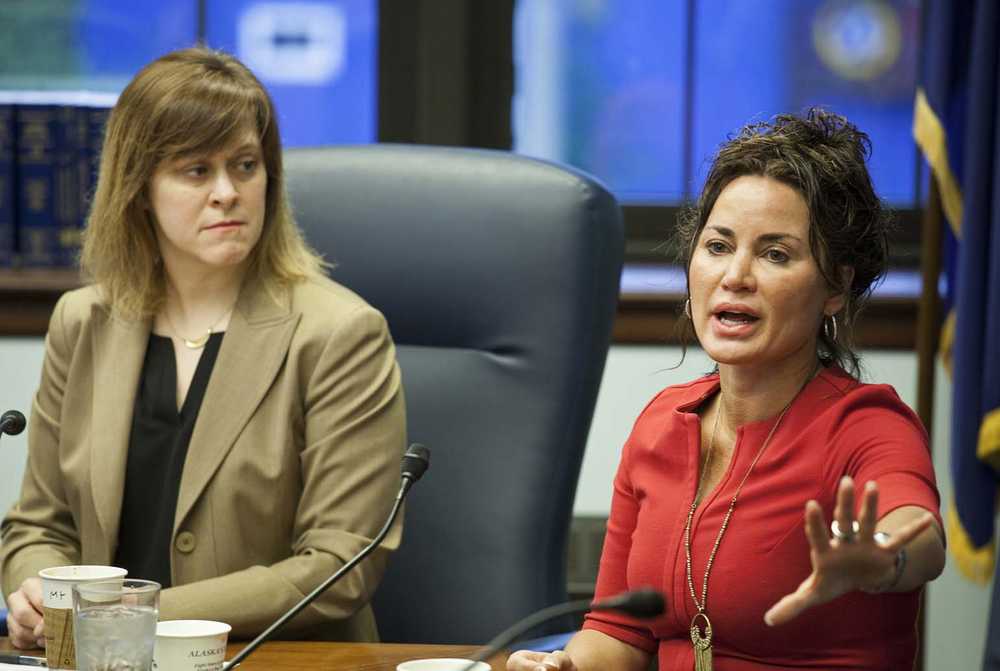JUNEAU — Gov. Bill Walker said Tuesday that as much of an optimist as he is, he doesn’t see state legislators wrapping up work on all the pieces needed for a fiscal plan by the scheduled end of the regular legislative session Sunday.
Walker wants lawmakers to approve a fiscal package to help dig the state out of a multibillion-dollar budget deficit exacerbated by low oil prices. He sees as key elements reduced state spending, a restructuring of Alaska Permanent Fund earnings and the dividend program, and new revenues that include a broad-based tax. He considers an income tax or a sales tax as a broad-based tax.
Walker and others have proposed reinstituting a personal state income tax, but a sales tax has not been proposed.
Senate President Kevin Meyer, R-Anchorage, said in a recent interview that he thought that for most in the Senate a state sales or personal income tax would be a last resort.
Walker said that when he began looking at ways to fill the deficit, he didn’t have much appetite for some of the options either. “But that didn’t mean I didn’t have to delve into it because it was fiscally responsible,” he said. “I don’t have an appetite for continuing on not knowing how we’re going to fund government after we run out of savings.”
The Senate Finance Committee on Tuesday made what co-chair Sen. Anna MacKinnon called a huge step forward in proposing a structured annual draw from permanent fund earnings and a dividend of $1,000 each of the next three fiscal years. House Finance rolled out its own version of that bill later in the day.
The proposal, a melding of ideas from bills proposed by Walker and lawmakers, calls for annual draw from fund earnings equal to 5.25 percent of the average market value of the fund for the first five of the preceding six fiscal years. Under a new calculation, the dividend would be funded with a portion of that and an amount equal to 20 percent of prior year resource royalties.
MacKinnon, R-Eagle River, called it the Senate’s best proposal at this time to close the budget gap “and to not impact individual Alaskans with taxes.” It doesn’t solve all of Alaska’s problems but goes a long toward stabilizing the state’s future, she said.
State Revenue Commissioner Randall Hoffbeck also saw the draft rewrite as a big step, but he said it’s not everything the administration needs in order to be satisfied with the session.
Renovation work is expected to begin on the state Capitol on Monday. If there needs to be a special session, Walker said he’ll see what lawmakers’ preference is for a location. He said the site isn’t as important to him as the work that is done.
Walker introduced a suite of bills that he said would put the state on a path to no longer needing to draw down savings to cover costs by fiscal year 2019. If a piece of that plan is scuttled, he wants something put in its place that would have a similar fiscal impact.
One of the issues legislators have been wrestling with is how far to push changes to the state’s oil and gas tax credit structure. The House planned to consider amendments to its rewrite of Walker’s bill late Tuesday, after previous delays in floor action. The Senate Resources Committee, meanwhile, unveiled a rewrite of its own this week that would phase out credits for Cook Inlet and impose no tax on Cook Inlet oil and gas production starting in 2018.
Oil and gas industry representatives expressed concern with the Senate Resources’ draft rewrite. Kara Moriarty, president and CEO of the Alaska Oil and Gas Association, said the loss of credits even without a production tax would have an impact. The state Revenue department says production tax on oil from Cook Inlet fields currently is zero.

